DIY SEO vs Hiring a Professional: Pros and Cons
When it comes to growing your business online, search engine optimization (SEO) is a major player in increasing visibility and driving traffic. You may have seen some progress from your own efforts, but it’s easy to wonder if you could be doing more. Should you continue managing SEO yourself or bring in a professional?
In this article, we’ll break down the pros and cons of handling SEO on your own versus hiring an expert. Whether you’re considering time, budget, or long-term growth, understanding both approaches will help you decide the best path forward.
Let’s explore each option in detail.
What should you consider before doing DIY SEO?
Before you consider DIY SEO, here are some things to check:
1. Budget constraints
SEO isn’t cheap. Yes, you read that right!
On average, you’ll spend $2,917 monthly to hire an SEO expert. If you’d rather work with an agency, expect to pay 138% more than the usual amount freelancers will charge. Consultants are not any cheaper, either. On average, an SEO consultant charges $3,250 per month.
Check out the full breakdown from Ahrefs:
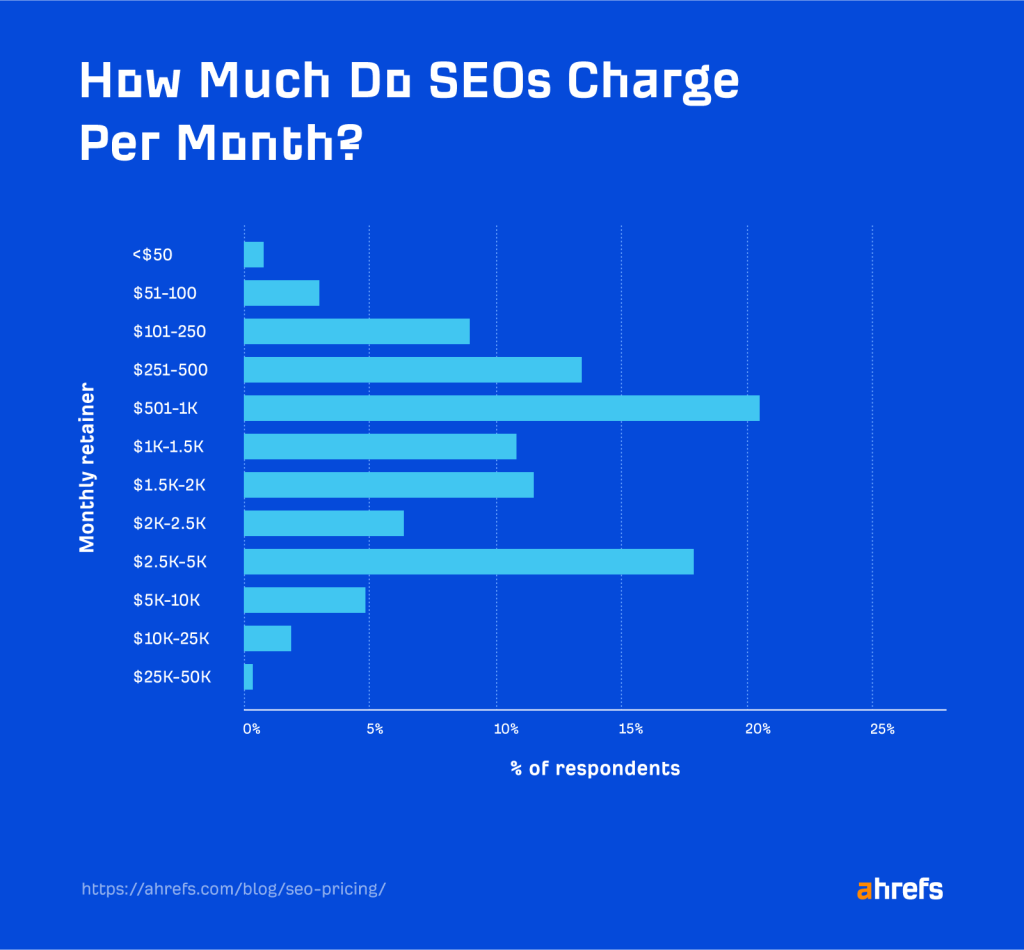
Another issue is that SEO isn’t a quick fix; it requires a long commitment to get results. Most SEOs understand this and may only want to go into a partnership if you’re willing to devote long-term (at least a year).
Of course, you’ll always find someone to handle your SEO for a few bucks. The image above shows that <10% of SEOs charge between $50 – $500 per month. However, SEO is a service-based business; you’ll likely get what you pay for. And if you opt for pay-for-performance SEOs or agencies, you most likely won’t like what you get.
For context, see this tweet from a business owner on X:
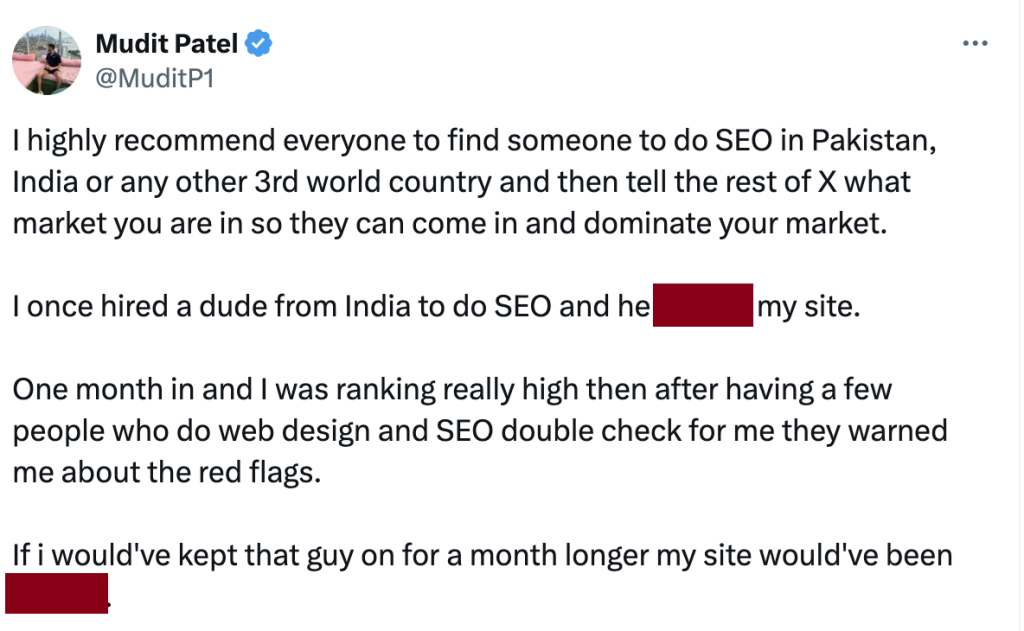
The freelancer he hired (is probably cheap) used black hat SEO tactics to rank his site high on search engines, but that almost cost him his business:

That said, it’s better to handle your SEO if you don’t have the budget to hire a reputable and verifiable professional.
2. Company Size:
Consider handling your SEO in-house if you’re a small business owner with few customers and ample website traffic. At this stage, you have enough time to learn SEO and the basic website optimization strategies to improve your search performance. Luckily, there are several actionable articles on Highervisibility’s blog on how to do this.
Resources from Search Engine Land, Backlinko, Search Engine Journal, etc., are additional helpful resources to streamline your learning process. If you have some funds to spare, invest in SEO courses on Udemy or snag free SEO certifications from SEMRush or HubSpot.
Check here for more SEO courses and certifications.
3. Other marketing channels are profitable:
Another thing to consider is your overall marketing strategy.
If you already have other channels driving bottom-line results, such as revenue or conversions, and don’t need to run a blog or create high-value content to attract high-value traffic and convert your visitors, you can decide to handle your SEO.
However, there are exceptions to this. If you’re in a (very) competitive industry like eCommerce or plan to expand into new markets, handling your SEO won’t suffice. You’ll need a professional to do the heavy lifting and scale your campaigns with the right strategy.
Benefits of DIY SEO
Here are some advantages of DIY SEO:
1. You have control over your SEO campaigns:
DIY SEO gives you total flexibility over your SEO campaigns.
You decide what gets implemented, changed, and, ultimately, the type of results to be generated. This is even more important if you run a business that handles sensitive customer data and the presence of an agency or external party is (too) risky. You can still outsource content production if you’re in a regulated industry, but it helps to keep aspects of the customer-focused data in-house.
2. It’s an opportunity to learn SEO:
SEO is broad and has several facets—on-page, off-page, technical, international, and local SEO. However, it’s not impossible to understand. By handling your SEO, you can learn the ropes and gain a hands-on knowledge of how it works for your business. Or how to use it to accelerate results.
3. Cost-savings:
This is probably the biggest advantage of handling your SEO.
Instead of paying an expert, you can learn (almost) everything you need to improve your website visibility online. Then, as your business grows and your budget increases, hire a professional to take the tasks off your plate.
DIY SEO isn’t all roses. Let’s get into the grim side:
Cons of DIY SEO
Here are a few disadvantages of handling your SEO:
1. It’s time-consuming:
SEO is only a distribution channel for your content. And if the content strategy fails, everything tumbles as well. This means if your content isn’t satisfying user intent or doesn’t align with your current marketing goals, you’re (likely) not going to see any meaningful results. Plus, you can’t randomly implement ‘best practices’ on your website without understanding your customers’ search intent.
So, you’ll need to spend (a lot of) time and resources researching:
- Your customers and their search intent,
- The queries they use to search for your products/services online (keyword research)
- The type of content they’d want to consume
- Your competitors and their current strategy.
All of these aren’t a day’s work.
Another thing is that SEO is an ever-evolving field. Search engines constantly update their algorithms to provide better user experiences and ensure search results match customers’ search patterns. You need to know about these changes and other trends in SEO to be able to win. As an entrepreneur, time is invaluable, and you might find it hard to shuffle between managing business operations and learning SEO.
2. The lack of expertise can lead to mistakes:
This is the costliest disadvantage of all.
SEO is a broad field; without a good understanding of the essentials, you risk making mistakes that will tank your website rankings or get you delisted from the search results.
For context, there are two major types of SEO practices: white-hat and Black-hat SEO. White-hat SEO covers all the good, search engine-verified tactics to succeed in search. Black-hat practices, on the other hand, are illegal and can cause your website to get penalized.
How do you know if you’re not violating any of Google’s guidelines? You’ll think everything is going right until you wake up the next day to find out your website has been penalized. During this time, you’ll likely lose traffic and your customers to your competitors.
See this post from Nate Matherson, co-founder of the GoPositional tool. He published content for ‘SEO,’ and saw a significant decrease in traffic after Google updated its algorithms:
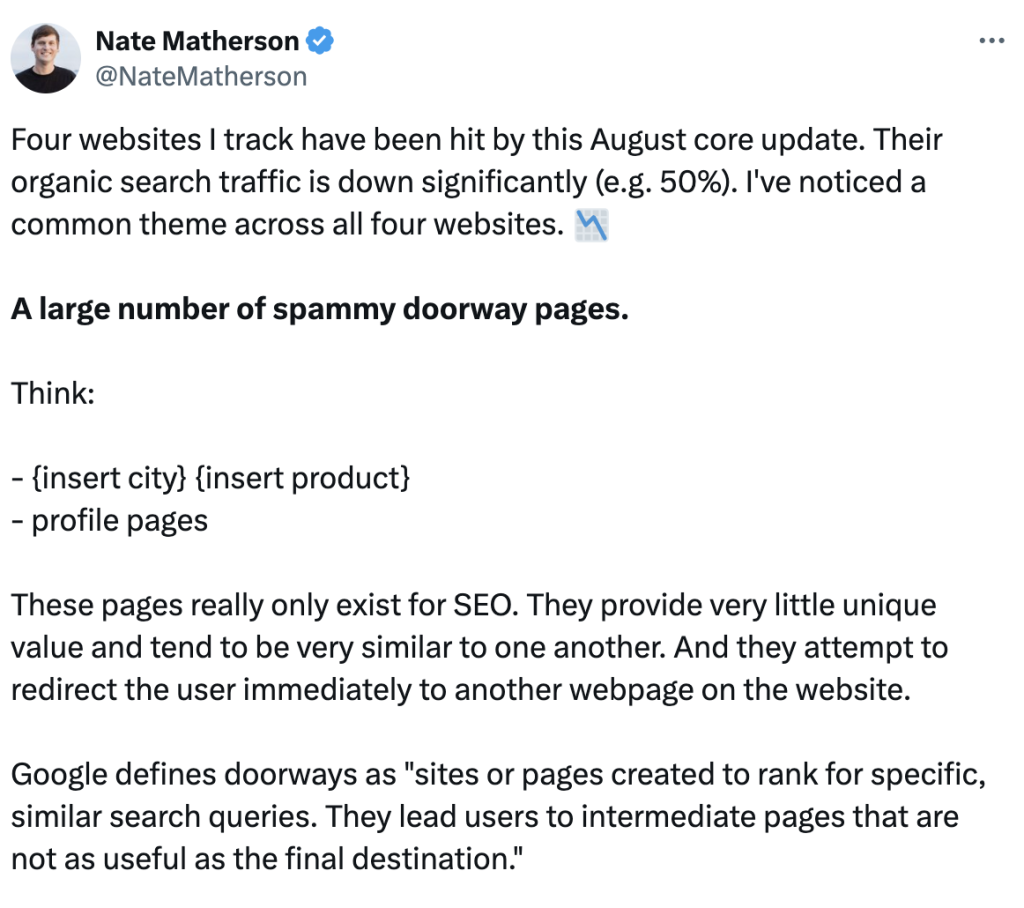
If you can’t risk making mistakes that will affect your business operations, it’s better to hire an expert. We wrote about how to hire an expert without getting burned here.
3. Results are slower:
While trying to learn the basics or how to implement these newly discovered strategies on your site, your competitors who have bigger marketing budgets and are working with an agency will outrank you on the search results. They’ll also get a lion’s share of the organic traffic (leads).
Now, let’s get into the other side:
What to consider when hiring an SEO expert
When is the right time to bring in an SEO expert? Here are some telltale signs:
1. Budget Flexibility:
As I shared in the first section of this piece, SEO isn’t cheap.
However, if you have enough money to cover the costs of bringing an expert in-house, go for it! SEO is like every other investment. If done correctly, it can bring in (sustainable) results for your website.
2. Company Size:
Another thing to consider is your company size.
If your business is growing (really) fast and your internal team is stretched thin, bringing in an expert can provide some relief while you channel your efforts into other areas. You can manage content strategy and outsource content creation. Or manage the business goals you want to focus on and hire an agency to prepare a custom strategy that can get you results.
3. Current SEO results:
What if you’re doing everything right without seeing any results from your SEO campaigns? Or:
- You’re getting a high traffic volume, but is it not converting to customers or improving bottom-line results?
- Your competitors are outperforming you on the search results despite all your efforts.
- Your organic traffic plummeted suddenly, and you don’t know why.
These are possible use cases of a failing SEO strategy, and partnering with the right SEO professional can help you get back on track.
Benefits of Hiring an SEO Expert
When you partner with an expert, you’ll get tangible results from your SEO campaigns and might not need to spend a dime on ads. Let’s examine a couple of other advantages:
1. Cost and time savings:
Considering all the costs of handling your SEO, you’ll realize you’re spending more compared to the results generated. How?
To handle your SEO, you have to purchase some tools to make your work easier. For starters, you should have the following in your tool stack:
- Ahrefs/SEMRush for keyword research (costs $129/mo and $139.95/mo for the smallest plans)
- Screaming Frog to audit your website and find technical SEO issues (costs $269/year ~ $22.4/mo)
- Grammarly for editing your content (costs $12/mo for the basic plan)
- Rankability/Surfer SEO for on-page SEO and content optimization (costs $149/mo and $89/mo)
- Yoast SEO for meta title and descriptions (costs $99/year ~ $8.25/mo)
- Mouseflow to optimize your site for user experience (costs $31/mo)
- Hunter.io for link-building outreaches (costs $49/mo)
- BrightLocal for Google My Business optimization and Local SEO (costs $39/mo)
This list doesn’t mean you need to prioritize all these tools. But on average, you’ll spend over $400/mo on basic SEO tools. This excludes the cost of buying SEO courses to close your knowledge gap. The time spent learning SEO, missed opportunities due to improper implementation or ignorance, trial and error strategies, etc., are hidden costs that outweigh the benefits of DIY SEO.
Reputable SEO agencies/professionals like HigherVisibility understand there’s no one-size-fits-all for SEO. This is why we take time to understand your business, target market, goals, and KPIs (key performance indicators) and propose a custom strategy based on your needs. This is more beneficial (in terms of results) and helps you save time and money in the long run.
2. Sustainable results (and fast)
Luckily, SEO results are long-term.
You can create one piece of high-value content that’ll continue to funnel high-quality, organic leads down your sales funnel. For example, this post from Chima Mmeje, the content marketing manager at Moz, highlights the importance of creating quality content tailored to your user’s search intent – they always stand the test of time.
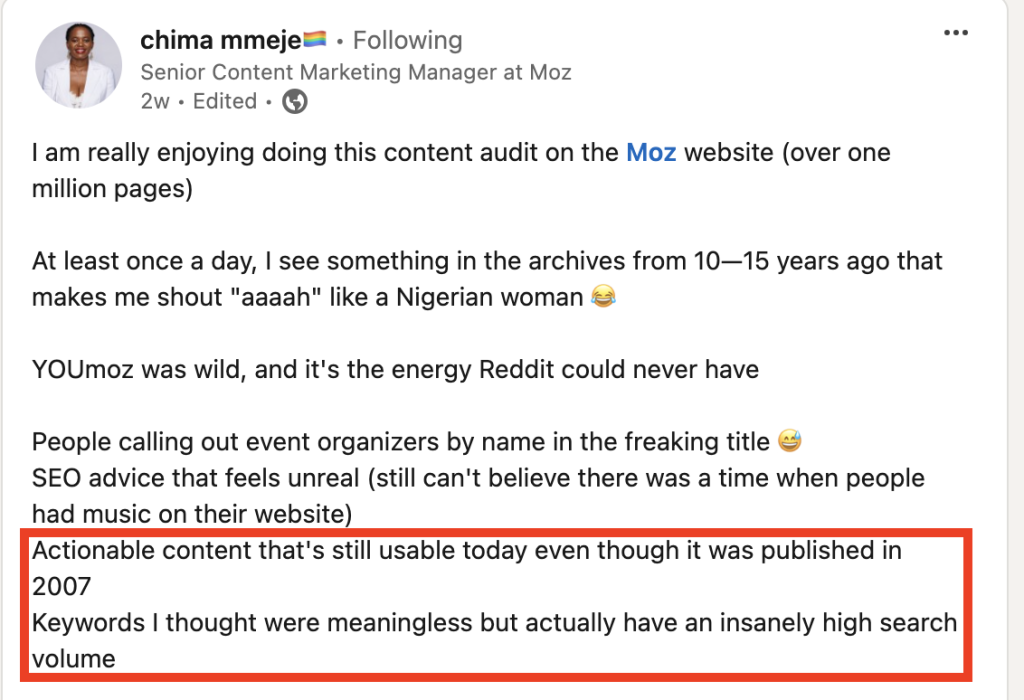
We’ve also experienced this at HigherVisibility. One of our articles, ‘How to Set Up SEO for Google Shopping,’ has remained on position #1 – #2 on Google’s first page after one year of publication:

This shows the benefits of working with an SEO professional. Instead of a generic approach, they implement user-focused strategies tailored to your website and needs. And whenever you discontinue their services, you’ll still benefit from the techniques they’ve implemented on your site.
3. Take advantage of industry knowledge:
Another advantage of working with experts is that you can tap into their wealth of knowledge and specialized experience, which they’ve acquired over time. They have also undergone different training in SEO, and they know what works and what doesn’t.
For instance, at HigherVisibility, we only hire professionals with proven track records delivering tangible SEO results.
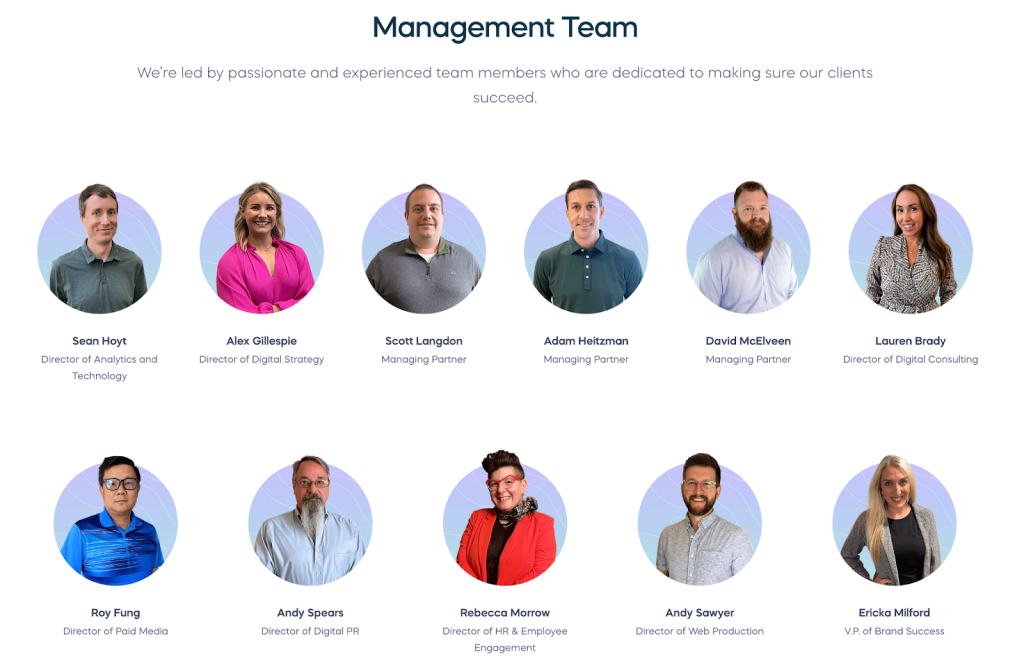
Each member of our team are equally recognized experts in their fields:
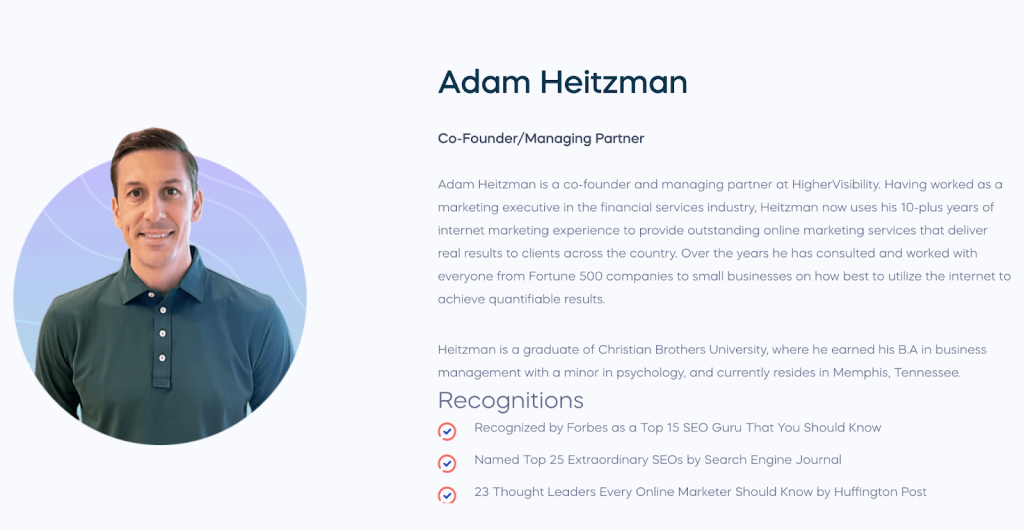
So, you can piggyback on these combined experience and expertise in SEO to improve your website performance.
4. Enjoy a holistic approach to SEO:
Except if you want to work with a freelancer or one-person team, partnering with an SEO agency gives you access to a complete SEO team comprising experts in different aspects of SEO. Instead of recommending a one-off strategy, they’re more likely to take a bird’s eye view of your site to find issues affecting your overall website performance. And as you grow, they’ll change their strategy to meet your other needs.
Cons of hiring an SEO professional:
Yes, there are some disadvantages you need to be aware of when partnering with an SEO agency:
1. Might be expensive for start-ups or small business owners:
SEO agencies and professionals are equally business owners and need to sustain their business. They may have members on their teams on a monthly salary and will cover monthly costs for the premium tools. These factors influence the costs of hiring an SEO agency or professional.
What to do: As a small business owner or start-up, manage basic tasks like content creation & optimization, keyword research, etc., and delegate complex tasks like technical SEO, implementing schema markup, minifying JavaScript & CSS files, etc., to the experts.
2. You have limited control over your campaign:
Except you’re bringing someone in-house, working with an agency limits your control over the SEO techniques implemented on your website.
While reputable SEO agencies would communicate with you every step of the way, they’re also likely to hold back some of their ‘best practices’ or ‘hacks.’ In this case, you can’t explicitly decipher whether it’s white hats or black hats tactics, and you have to depend on the agency’s credibility to protect your website.
What to do: Before hiring anyone, ask the right questions to ensure you’re clear on their basic SEO workflow. The SEO freelancer or agency should give you a full breakdown of all the strategies they’ll use on your site and the results to expect.
At HigherVisibility, for example, our clients never have to second-guess what we do to improve their rankings or conversions. We created an agency-client workflow that keeps the clients in the loop on all the deliverables, performance, and updates. We even assign a brand success manager (BSM) to each client so they always have someone to contact whenever they have questions.
3. Finding the right partner can be challenging:
Every SEO on the internet claims to be doing the right thing and promises high rankings, traffic, and conversions. How do you filter the quality guys from those after your money? We’ve had clients who hesitated to work with us from the outset because of their experience with other agencies.
What to do: Not every agency/expert is the right fit for your agency. Before making any investments, verify their credibility in handling similar cases as yours.
DIY vs SEO Expert: Which way to go?
As you can see, both options have unique use cases, and none is a better option than the other. However, choosing between DIY and hiring an expert depends on your goals and budget.
If you’re serious about scaling your business and want to see sustainable, long-term growth, hiring an SEO expert is an investment worth making. At HigherVisibility, we’ve helped businesses just like yours climb the rankings, bringing in real results. Ready to take the next step? Request your free proposal today and see how we can help your business thrive online.
